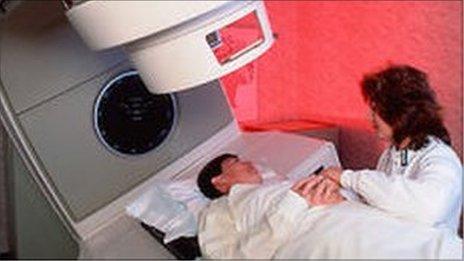Four in ten will get cancer
- Published
- comments
I can still remember as a small boy asking my mother to explain how a neighbour and family friend had met her death. My mum whispered that she thought it was - and here her voice dropped to a whisper - cancer.
The very word was so dreadful that it was to be spoken in hushed tones, rather like saying the name "Lord Voldemort" is taboo for most characters in the Harry Potter novels.
Cancer is no longer a taboo word because so much has changed since the 1960s. Survival rates have doubled. A diagnosis is clearly a very significant and life-changing event, but is not inevitably a life-ending one.
Awareness of cancer risks has improved - most notably the danger from smoking. There have been major improvements in diagnosis and treatment. All of this is just as well, because more and more of us are going to get cancer.
For a long time it used to be that one in three of us would get cancer, but now it seems that has risen to four in 10. The charity Macmillan Cancer Support estimates that 42% of people will have had a cancer diagnosis by the time of their death. Of these, 64% will die from cancer.
Ageing population
The estimates are based on a study published two years ago in the British Journal of Cancer. That study estimated two million people in the UK had a cancer diagnosis and this was rising steadily by around 3% a year. Macmillan says if this rate of increase continues then four million people could be living with cancer by 2030.
Cancer Research UK (CRUK) says the main reason is our ageing population. Put another way, since more people than ever are living longer, more people are getting cancer - because age is the single most important risk factor. To put the "age factor" into some kind of context, it is worth pointing out that the risk of a cancer diagnosis up to the age of 50 is one in 36 for men and one in 21 for women.
Lifestyle factors
Another factor is improved diagnosis which means more people are getting their cancer spotted early. Improved detection of prostate cancer is one example of this.
But this does not mean that cancer is always just "one of those things". Lifestyle factors also play a significant role. CRUK reckons that up to half of all cancers could be prevented.
Dwarfing all other lifestyle choices, is avoiding smoking. Obesity, lack of fitness, poor diet and repeated over-exposure to the sun are among other factors.
So hearing the news today that four in 10 of us will get cancer at some point is not an excuse for ignoring our health. A fatalistic approach to health - which all of us have to some degree - can be, well, fatal.
- Published14 July 2011
